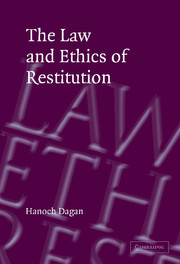Book contents
- Frontmatter
- Contents
- Acknowledgments
- Table of cases
- Table of statutes and treaties
- 1 Introduction
- 2 Preventing unjust enrichment
- 3 Mistakes
- 4 Other-regarding conferrals of benefits
- 5 Self-interested conferrals of benefits
- 6 Restitution in contexts of informal intimacy
- 7 Wrongful enrichments
- 8 Restitution in a contractual context
- 9 Restitution in bankruptcy
- 10 Reasons for restitution
- Bibliography
- Index
4 - Other-regarding conferrals of benefits
Published online by Cambridge University Press: 05 July 2009
- Frontmatter
- Contents
- Acknowledgments
- Table of cases
- Table of statutes and treaties
- 1 Introduction
- 2 Preventing unjust enrichment
- 3 Mistakes
- 4 Other-regarding conferrals of benefits
- 5 Self-interested conferrals of benefits
- 6 Restitution in contexts of informal intimacy
- 7 Wrongful enrichments
- 8 Restitution in a contractual context
- 9 Restitution in bankruptcy
- 10 Reasons for restitution
- Bibliography
- Index
Summary
In 1880, in Dalles City, Oregon, a large and valuable load of lumber fell into the Columbia River and was about to be carried away by the current. Since Savage, the owner of this lumber, was absent from the scene, Glenn – who, at that time, was doing construction work for Savage – “furnished help and did service” in saving the lumber “from being washed away and lost.” Seven years later, the Supreme Court of Oregon rejected Glenn's claim that Savage owed him the reasonable value of his services as well as of the services of the workmen he employed in saving the lumber. The Court did not deny that these services had been “meritorious, and probably beneficial, to Savage,” but it nonetheless insisted that the services “could not create a legal liability on the part of Savage.” “To make him liable,” the Court ruled, “he must either have requested the performance of the service, or, after he knew of the service, he must have promised to pay for it.” Otherwise, the law deems “an act done for the benefit of another, without his request, as a voluntary act of courtesy, for which no action can be sustained.” Were it otherwise, the Court explained, the result would be “ruinous litigation, and the overthrow of personal rights and civil freedom”; people would lose control over their private businesses: no one would be “free from the interference of strangers, perhaps idlers, drunkards, and perhaps enemies,” who may “under such pretences,” draw people “from business into litigation.”
- Type
- Chapter
- Information
- The Law and Ethics of Restitution , pp. 86 - 122Publisher: Cambridge University PressPrint publication year: 2004



